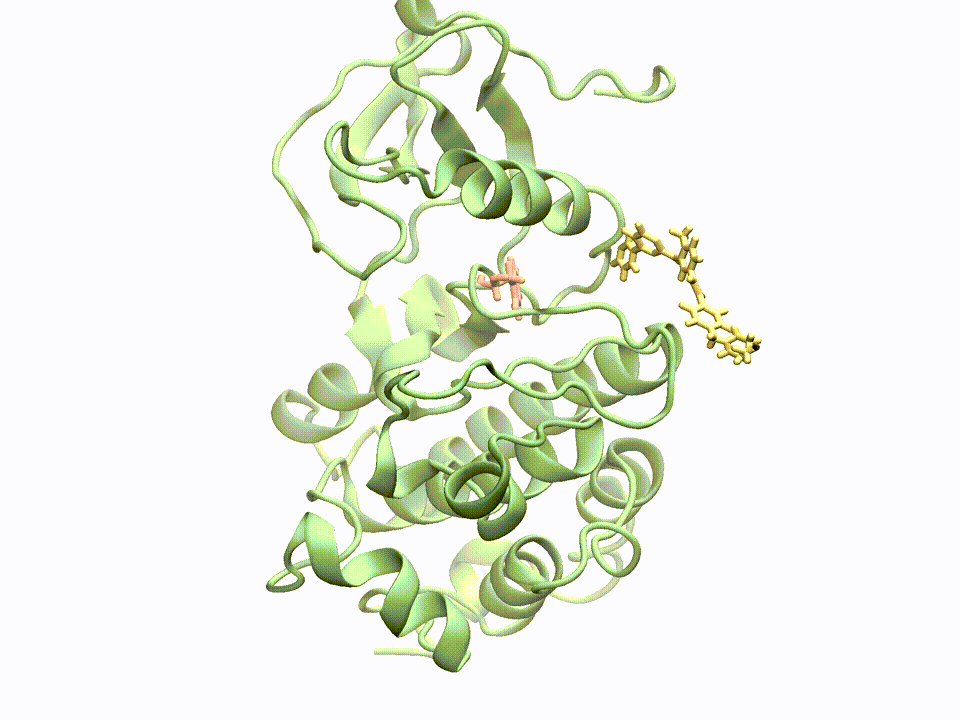Source code for the Nature Communications paper DynamicBind: predicting ligand-specific protein-ligand complex structure with a deep equivariant generative model.
DynamicBind recovers ligand-specific conformations from unbound protein structures (e.g. AF2-predicted structures), promoting efficient transitions between different equilibrium states.
Create a new environment for inference. While in the project directory run
conda env create -f environment.yml
Or you setup step by step:
conda create -n dynamicbind python=3.10
Activate the environment
conda activate dynamicbind
Install
conda install pytorch torchvision torchaudio pytorch-cuda=11.7 -c pytorch -c nvidia
conda install -c conda-forge rdkit
conda install pyg pyyaml biopython -c pyg
pip install pyg_lib torch_scatter torch_sparse torch_cluster torch_spline_conv -f https://data.pyg.org/whl/torch-2.0.0+cu117.html
pip install e3nn fair-esm spyrmsd
Create a new environment for structural Relaxation.
conda create --name relax python=3.8
Activate the environment
conda activate relax
Install
conda install -c conda-forge openmm pdbfixer libstdcxx-ng openmmforcefields openff-toolkit ambertools=22 compilers biopython
Download and unzip the workdir.zip containing the model checkpoint form https://zenodo.org/records/10137507, v2 is contained here https://zenodo.org/records/10183369.
By default: 40 poses will be predicted, poses will be ranked (rank1 is the best-scoring pose, rank40 the lowest), relax processes are included.
- Protein (PDB File):
protein.pdb- Automatically cleaned to remove non-standard amino acids, water molecules, or small molecules.
- Ligand (CSV File):
ligand.csv- Must contain a column named 'ligand' listing smiles.
- Number of Animations:
- outputs intermediate pkl data, not the final animation PDB. (After
--savings_per_complex, default is 40)
- outputs intermediate pkl data, not the final animation PDB. (After
- Frames in Animation/inference_steps:
- default is 20.
--header: Name of the result folder.--device: GPU device ID.--python: Python environment for inference.--relax_python: Python environment for relaxation.--num_workers: Number of processes for final output relaxation.
python run_single_protein_inference.py protein.pdb ligand.csv --savings_per_complex 40 --inference_steps 20 --header test --device $1 --python /gxr/luwei/anaconda3/envs/dynamicbind/bin/python --relax_python /gxr/luwei/anaconda3/envs/relax/bin/pythonThe results of the docking step, typically found in the results/test folder, include:
- Affinity Score for Each Complex:
affinity_prediction.csv - Pose Score and Conformation of Each Animation: Example files like
rank1_ligand_lddt0.63_affinity5.67_relaxed.sdf(where 0.63 is the pose score) and corresponding protein.pdbfiles. - Data for Animation Generation: Such as
rank1_reverseprocess_data_list.pklandrank2_reverseprocess_data_list.pkl.
Inputs:
- Data from Docking Output: Indicated by paths like
results/test/index0_idx_0/. The notation "1+2" implies that movies for rank1 and rank2 poses are needed. - Number of Animations: Specified by the user (default is "1").
python movie_generation.py results/test/index0_idx_0/ 1+2 --device $1 --python /path/to/dynamicbind/python --relax_python /path/to/relax/pythonOutputs:
- Final Animation PDB Files: Located in
results/test_1qg8/index0_idx_0/, with files likerank1_receptor_reverseprocess_relaxed.pdbandrank1_ligand_reverseprocess_relaxed.pdb.
Example command for HTS:
python run_single_protein_inference.py protein.pdb ligand.csv --hts --savings_per_complex 3 --inference_steps 20 --header test --device $1 --python /path/to/dynamicbind/python --relax_python /path/to/relax/pythonHTS Output files:
complete_affinity_prediction.csvaffinity_prediction.csv
https://zenodo.org/records/10429051
@article{lu2024dynamicbind,
title={DynamicBind: predicting ligand-specific protein-ligand complex structure with a deep equivariant generative model},
author={Lu, Wei and Zhang, Jixian and Huang, Weifeng and Zhang, Ziqiao and Jia, Xiangyu and Wang, Zhenyu and Shi, Leilei and Li, Chengtao and Wolynes, Peter G and Zheng, Shuangjia},
journal={Nature Communications},
volume={15},
number={1},
pages={1071},
year={2024},
publisher={Nature Publishing Group UK London}
}